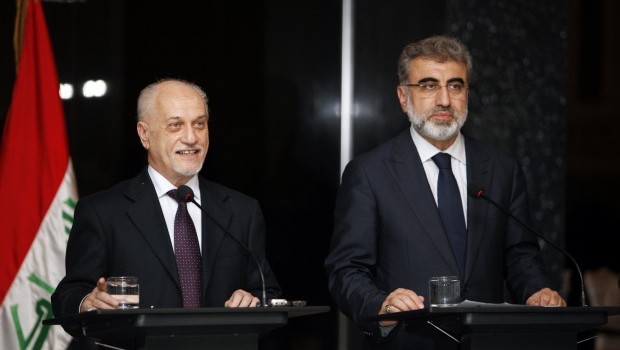
Iraq’s Deputy Prime Minister for Energy Hussain al-Shahristani (L) speaks during a joint news conference with Turkey’s Energy Minister Taner Yildiz in Baghdad December 1, 2013 (REUTERS/Ahmed Saad)
Reuters reported that Turkey and Iraqi Kurdistan signed a multi-billion-dollar energy package last week, infuriating a central Baghdad government which claims sole authority over Iraqi oil exports and is wary of any moves that could extend political autonomy to the region.
Turkish Energy Minister Taner Yildiz met Iraq’s deputy prime minister for energy, Hussain Al-Shahristani, in Baghdad on Sunday to try to mend ties with a federal government which says independent Kurdish oil exports would be illegal. The affair has soured relations between Ankara and Baghdad.
“We stand by the agreement we did with northern Iraq but we hope this can be carried out through a three-way mechanism,” Yildiz told a conference in Erbil, the capital city of the Kurdistan region. “As Turkey, we are trying to move this forward in a careful and courteous way.”
“We also would like to have the consent of the Central Government of Iraq for the commercial export of oil from the KRG to Turkey and start a trilateral cooperation scheme that will be beneficial to all.”
The Kurdish north of Iraq has enjoyed autonomy since the 1990-1991 Gulf War when a US-led coalition drove Iraqi occupying troops out of Kuwait.
Since the overthrow of president Saddam Hussein in a second Gulf war in 2003, that autonomy has grown in a region largely saved from the civil conflict that has gripped the rest of the country. Baghdad fears growing economic autonomy could drive moves towards the creation of an independent Kurdish state.
Baghdad claims sole authority over Iraqi oil exports, while the Kurdistan Regional Government (KRG) says it has the right to sell the oil independently and has recently built its own pipeline to export crude to Turkey.
Yildiz confirmed that the details of the deal have been agreed, but none of the officials would comment on whether the final agreement had actually been signed.
“The formalities were recently completed…the finalization of such cooperation is a great achievement for Iraq and the Kurdistan region and this process will bring us together,” KRG Prime Minister Nechirvan Barzani told the Erbil conference.
He suggested the deal could work to Baghdad’s benefit.
“For the first time the Kurdistan region will become a net contributor to the Iraqi national income and that’s why we need to sit down with our colleagues in the Iraqi government as equal partners,” he said, according to an English translation of his comments.
Baghdad might prove hard to persuade, having resisted for years Erbil’s moves towards direct exports.
Officials would not say whether crude flows through the pipeline had started yet.
“Our new pipeline is complete…(It is) tried and tested and when fully operational can take 300,000-400,000 bpd,” KRG energy minister Ashti Hawrami told the conference.
“We also would like our colleagues in Baghdad to work with us in harmony but this doesn’t mean that we have come to a standstill, everything is moving on…Turkey is trying to create goodwill.”
Turkey, which is heavily dependent on imports to satisfy its growing appetite for energy, wants Iraqi Kurdistan’s oil to help diversify its energy supplies.
Turkey has repeatedly said it respects Iraq’s sensitivities over territorial integrity and that increasing oil revenues will help the whole of Iraq.
Oil exports from the Kurdish region via an Iraq-Turkey pipeline had dried up due to a row over the sharing of oil revenues between Erbil and Baghdad. The deal between Turkey and the Kurds also offers a solution to the payment problems.
